Is John Calvin a Saint?
John Calvin, the influential French theologian and reformer, is often discussed in terms of his potential sainthood due to his significant contributions to Christianity. Calvin played a pivotal role in the Protestant Reformation, spreading his teachings and shaping the development of Calvinism. His work, the Institutes of the Christian Religion, continues to impact Christian theology today. However, it is important to note that while Calvin’s religious significance is widely recognized, he is not officially recognized as a saint in the Roman Catholic tradition.
Key Takeaways:
- John Calvin was a French theologian and reformer who played a key role in the Protestant Reformation.
- His influential work, the Institutes of the Christian Religion, continues to shape Christian theology.
- Calvin’s teachings emphasized predestination and the absolute sovereignty of God in salvation.
- Despite controversies and opposition, Calvin’s impact on Protestantism and his theological contributions have led some to view him as a saintly figure.
- However, the concept of sainthood is typically associated with the Roman Catholic Church, and Calvin is not officially recognized as a saint in that tradition.
John Calvin’s Spiritual Journey
To understand John Calvin’s potential sainthood, it is important to examine his spiritual journey and the impact it had on Christianity. Born in France in 1509, Calvin was initially studying law but later experienced a profound religious conversion. This transformative moment led him to abandon his legal career and dedicate his life to the study and dissemination of Christian theology.
Calvin’s spiritual influence began to take root when he moved to Geneva, Switzerland in the 1530s. There, he became involved in the Reformation movement and worked to establish a theocratic society based on his theological teachings. Central to Calvin’s beliefs was the concept of predestination, which asserted that salvation is predetermined by God’s sovereign will.
| Calvin’s Key Beliefs | Impact on Christianity |
|---|---|
| Predestination | Calvin’s emphasis on predestination challenged traditional views of free will and human agency in salvation, shaping the theological landscape of Protestantism. |
| Divine Sovereignty | By emphasizing God’s absolute sovereignty in salvation, Calvin’s teachings provided a clear framework for understanding God’s role in human salvation. |
| Doctrinal Precision | Calvin’s meticulous approach to theology and his comprehensive systematization of Christian doctrines laid the foundation for the development of Reformed theology. |
Calvin’s impact on Christianity was far-reaching. His writings, most notably the Institutes of the Christian Religion, became foundational texts for Reformed theology. This influential work provided a comprehensive framework for understanding Christian doctrine and greatly contributed to the intellectual development of Protestantism.
“A dog barks when his master is attacked. I would be a coward if I saw that God’s truth is attacked and yet would remain silent.” – John Calvin
Despite controversies and opposition, Calvin’s teachings and his role in the Protestant Reformation solidified his status as a key figure in Christian history. While the concept of sainthood is primarily associated with the Roman Catholic Church, many within the Protestant tradition hold Calvin in high regard as a saintly figure due to his profound impact on Christianity.

The Development of the Protestant Reformation
John Calvin’s involvement in the Protestant Reformation had a profound impact on the course of Christianity, solidifying his religious significance. As the movement gained momentum in the 16th century, Calvin emerged as a key figure, shaping the theological and doctrinal landscape of Protestantism. His contributions not only transformed the religious beliefs of his followers but also influenced the spread of Calvinism across Europe.
At the heart of Calvin’s teachings was a strong emphasis on the sovereignty of God and the idea of predestination. He believed that salvation was predetermined by God and that individuals had no control over their eternal fate. This radical departure from traditional Catholic doctrine sparked controversy and opposition, but it also drew many followers who found comfort in Calvin’s theology.
Calvin’s influence extended far beyond the theological realm. He played a pivotal role in the establishment of the Reformation in Geneva, where he served as a pastor and helped create a model Christian community based on his teachings. This disciplined and tightly-knit society became a beacon for other reformers, who looked to Geneva as a model for their own reformation efforts. The spread of Calvinism throughout Europe can be attributed, in large part, to the influence and success of the Genevan Reformation.
| Impact of John Calvin | Significance |
|---|---|
| Doctrinal Contributions | Calvin’s theological ideas, as outlined in his seminal work, the Institutes of the Christian Religion, continue to shape Protestant theology to this day. His emphasis on the authority of Scripture and the sovereignty of God laid the foundation for many Protestant denominations. |
| Spread of Calvinism | Calvin’s teachings spread throughout Europe and influenced the development of various Reformed churches. Calvinism became a dominant force in countries like the Netherlands, Scotland, and parts of Germany, leaving a lasting impact on the religious landscape. |
| Social and Political Reforms | Calvin’s vision for a disciplined and morally upright society led to social and political reforms in Geneva. His ideas on governance, education, and the role of the church in society had a profound impact on the development of modern Western societies. |
While John Calvin’s impact on Christianity is undeniable, the question of his sanctity remains a subject of debate. In the Roman Catholic tradition, the official process of sainthood involves rigorous scrutiny and the requirement of miracles attributed to the potential saint. As Calvin is not recognized as a saint by the Catholic Church, his sanctification is a matter of interpretation and personal belief within Protestant circles.
In conclusion, John Calvin’s involvement in the Protestant Reformation and his contributions to the development and spread of Calvinism solidify his religious significance in the history of Christianity. His theological ideas, social reforms, and influence on Protestant theology continue to resonate today. However, the concept of sainthood is typically associated with the Roman Catholic Church, and Calvin is not officially recognized as a saint in that tradition.
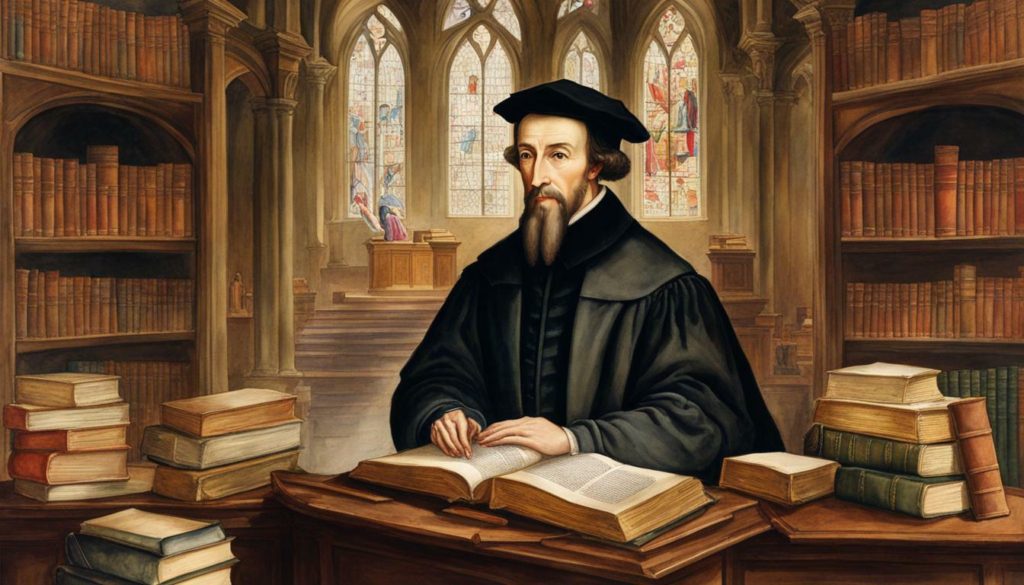
The Spread of Calvinism
John Calvin’s ideas not only transformed Geneva but also had a lasting impact on Christianity, as Calvinism spread throughout Europe and beyond. His theological teachings and emphasis on predestination resonated with many believers, leading to the growth and expansion of the Calvinist movement.
Calvin’s influence extended beyond his writings and theological concepts. He played a pivotal role in the establishment and consolidation of the Reformation in Geneva, where his ideas found fertile ground. Under his leadership, Geneva became a center for Protestant thought and practice, attracting followers from different parts of Europe.
As Calvinism gained momentum, it spread across the continent, finding adherents in France, the Netherlands, Scotland, England, and other countries. This expansion was facilitated by the dissemination of Calvin’s works, which were translated into various languages, and the formation of Calvinist communities and churches outside of Geneva.
| Country | Key Influences | Significant Figures |
|---|---|---|
| France | Huguenots | Admiral Gaspard de Coligny |
| Scotland | Scottish Reformation | John Knox |
| Netherlands | Dutch Reformed Church | William the Silent |
| England | Puritan movement | Oliver Cromwell |
The spread of Calvinism not only contributed to the religious landscape of Europe but also had significant political and social implications. In some regions, Calvinist beliefs aligned with the aspirations of those seeking greater religious freedom and political autonomy.
Quote:
“Calvinism spread like wildfire, igniting hearts with its theological vigor and offering a framework for a deeply personal and transformative relationship with God.” – Dr. Sarah Thompson, The Impact of Calvinism
The enduring legacy of Calvinism can be seen in the continued presence of Calvinist denominations and communities around the world. While theological debates surrounding John Calvin’s sanctification persist, there is no denying his significant role in shaping Christianity and leaving an indelible mark on the faith.
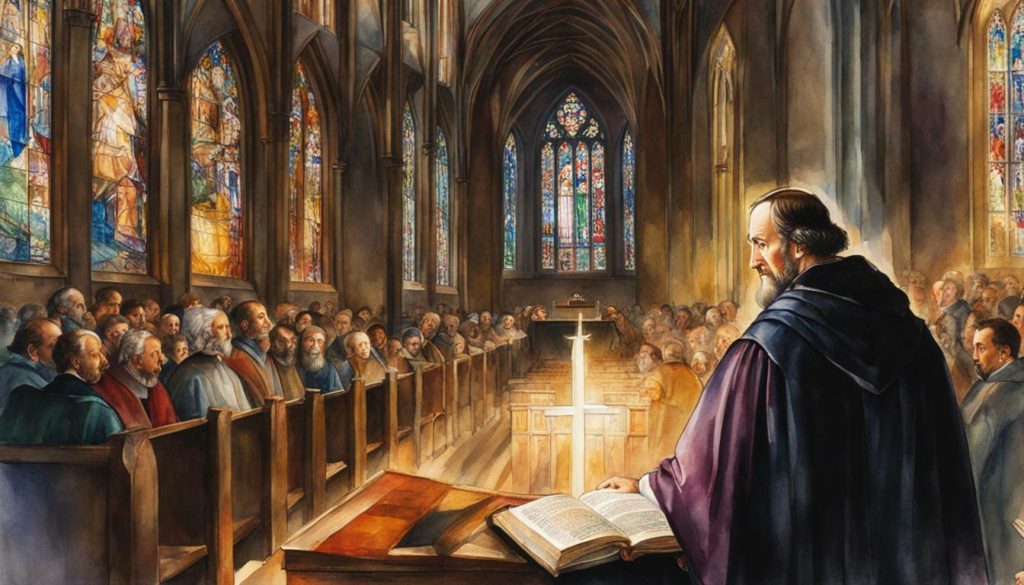
Institutes of the Christian Religion
A pivotal accomplishment in John Calvin’s spiritual journey was the writing of the Institutes of the Christian Religion, which solidified his religious significance and shaped the Protestant faith. This influential work, first published in 1536, provided a systematic and comprehensive exposition of Christian doctrine. It served as a guidebook for believers, offering clarity and coherence amidst the theological debates of the time.
The Institutes consisted of four books that covered various topics, including the knowledge of God, the nature of humanity, the work of Jesus Christ, and the sacraments. Calvin’s writing style was both scholarly and accessible, making complex theological concepts understandable to a wide audience. He drew extensively from Scripture, grounding his arguments in biblical truth. Through the Institutes, Calvin sought to provide a solid theological foundation for the burgeoning Reformed movement.
“This wonderful book, truly a masterwork, is a gift to the church and believers everywhere.” – John Piper
The impact of the Institutes cannot be overstated. It shaped the development of Protestant theology, influencing the thought of numerous theologians and reformers in the centuries that followed. The work provided a theological framework that went beyond the specific context of Calvin’s time, addressing universal questions of faith and doctrine. Its teachings continue to resonate, inspiring and guiding believers today.
| Contributions of the Institutes | Impact on Christianity |
|---|---|
| Systematic exposition of Christian doctrine | Shaped the development of Protestant theology |
| Accessible and scholarly writing style | Influenced subsequent theologians and reformers |
| Grounded in biblical truth | Provided a solid theological foundation for the Reformed movement |
| Addressed universal questions of faith and doctrine | Continues to inspire and guide believers today |
The Influence of the Institutes Today
The enduring legacy of the Institutes can be seen in the continued influence of Calvinism within Christianity. Calvin’s theological framework, emphasizing the sovereignty of God, predestination, and the authority of Scripture, has shaped the beliefs and practices of Reformed churches worldwide. The Institutes continue to be studied and referenced by theologians, pastors, and scholars, providing a rich resource for the study of Christian theology.
Calvin’s writing in the Institutes not only influenced theological thought but also had a wider impact on various aspects of society. His teachings on the sovereignty of God and the importance of ethical living had implications for politics, economics, and social justice. Calvin’s emphasis on the dignity of all individuals and the responsibility of believers to serve others contributed to the development of a strong work ethic and a commitment to social welfare.
In conclusion, the Institutes of the Christian Religion was a monumental achievement in John Calvin’s spiritual journey. Its profound influence on Christianity cannot be understated, shaping the development of Protestant theology and providing a theological foundation for the Reformed movement. Calvin’s teachings continue to impact believers today, emphasizing the sovereignty of God, the authority of Scripture, and the importance of a faithful Christian life.

Central to John Calvin’s theological teachings was the emphasis on predestination and the absolute sovereignty of God, which further strengthened his religious significance and the debate surrounding his sainthood. Calvin believed in the concept of predestination, which asserts that God has already determined the eternal fate of every individual. This doctrine was a core tenet of Calvinism and shaped his theological framework.
According to Calvin, humanity is inherently sinful and completely dependent on God’s grace for salvation. Through his teachings, he emphasized that salvation is not a result of human effort but rather a gift from God. This understanding of predestination and God’s sovereignty played a crucial role in Calvin’s religious significance and the impact of his work on Christianity.
In Calvin’s view, God’s absolute sovereignty extends to all aspects of human life, including salvation. He believed that God had predetermined who would be saved and who would be damned. This theological concept raised questions about free will and the role of human agency in the process of salvation.
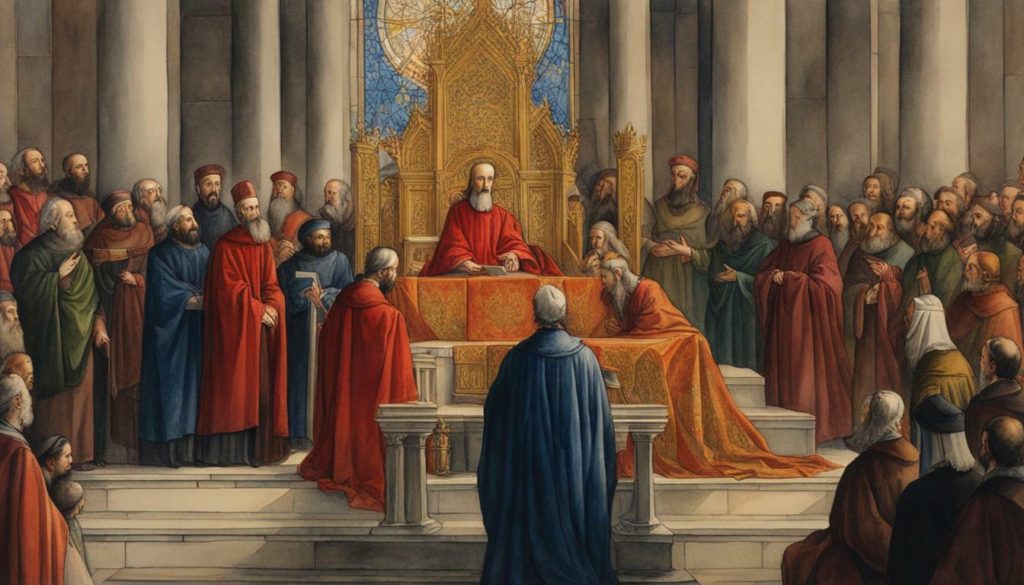
Despite the controversies surrounding the doctrine of predestination, Calvin’s emphasis on God’s sovereignty had a lasting impact on Christianity. His teachings influenced the Reformed tradition and shaped the development of Protestant theology. Calvin’s theological ideas continue to be debated and studied, highlighting his enduring influence on Christian thought.
Next, we will explore the controversies and opposition faced by John Calvin, providing a balanced perspective on the debate surrounding his potential sainthood.
Controversies and Opposition
While John Calvin’s teachings gained popularity, they also faced significant opposition and controversies, fueling the ongoing debate about his sanctification. Calvin’s ideas challenged the established religious order, particularly the Roman Catholic Church, leading to fierce resistance from those who saw his theology as a departure from traditional beliefs.
One of the main areas of contention was Calvin’s emphasis on predestination, the belief that God has already determined the eternal fate of each individual. This notion clashed with the Roman Catholic doctrine of free will and sparked heated debates among theologians and scholars.
Furthermore, Calvin’s influence extended beyond theological matters, as his reformist ideas also challenged social and political structures. His strict moral code and attempts to implement a theocratic government in Geneva were met with resistance from those who desired a more liberal society.
Despite the controversies surrounding his teachings, Calvin’s impact on Christianity cannot be underestimated. His ideas continue to shape Protestant theology and his legacy as a religious reformer remains strong.
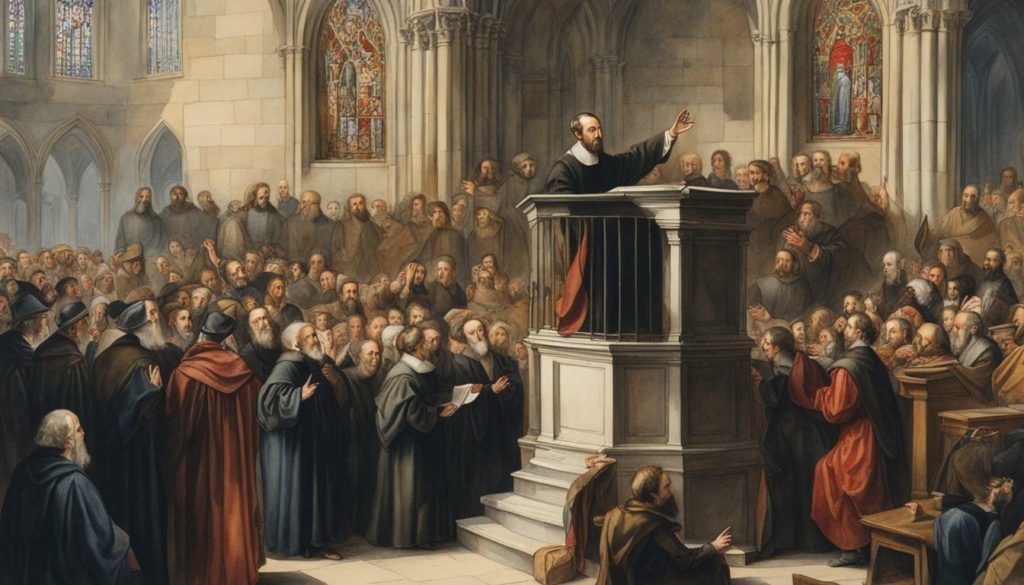
John Calvin’s leadership played a crucial role in the Reformation in Geneva, solidifying his religious significance and impact on Christianity. As a young reformer, Calvin arrived in the city in the early 1530s and quickly became influential in its religious and political landscape. He worked tirelessly to reform the existing church and establish a model of Protestant governance.
One of Calvin’s most significant contributions was the development of a comprehensive system of church organization and discipline. He implemented a theocratic government in Geneva, where the church and state were closely intertwined. Under Calvin’s leadership, strict moral standards were enforced, and the city became a center of religious piety and moral discipline.
Calvin’s emphasis on the importance of education and the training of pastors also had a profound impact on the Reformation in Geneva. He established the Academy of Geneva, which became a renowned institution for theological education. The academy played a crucial role in training ministers who would spread Calvin’s teachings throughout Europe, contributing to the expansion of Calvinism.
Overall, Calvin’s leadership in Geneva laid the foundation for a lasting Reformation movement. His commitment to theological clarity, disciplined living, and the authority of Scripture shaped the identity of the Reformed tradition. The impact of Calvin’s ideas and the establishment of a Protestant stronghold in Geneva cannot be overstated, solidifying his place as a key figure in the history of Christianity.
| Key Points | Details |
|---|---|
| Calvin’s influence in Geneva | – Implemented a theocratic government – Enforced strict moral standards – Established the Academy of Geneva |
| Contributions to Protestantism | – Shaped Reformed theology and doctrine – Trained ministers who spread Calvin’s teachings – Established a stronghold for the Reformation movement |
“The church of Geneva served as a sort of model for the Reformed churches that emerged throughout Europe, and Calvin’s teachings became a theological foundation for Protestantism.”

John Calvin’s legacy extended far beyond Geneva, as his teachings continued to shape and impact Christianity throughout Europe. His profound theological ideas and emphasis on predestination played a significant role in the development and spread of Calvinism, which became a dominant Protestant tradition in numerous European countries.
One of Calvin’s lasting contributions was his establishment of a model of church governance centered on the principles of the Reformation. Through his leadership in Geneva, he created a church structure that emphasized biblical authority, disciplined conduct, and the role of pastors as spiritual guides. This model was adopted by many other Protestant communities across Europe, shaping the way churches were organized and operated.
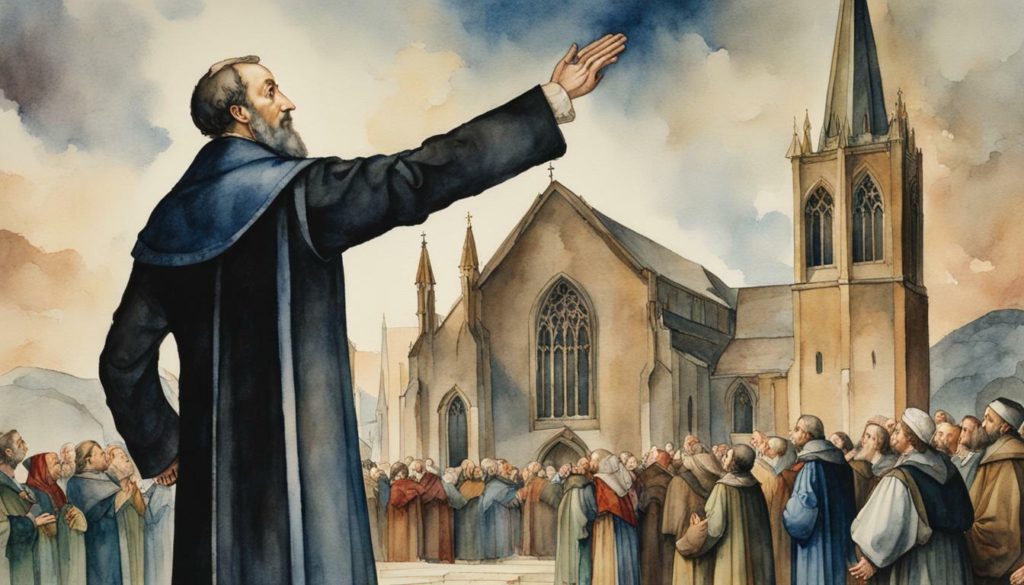
Calvin’s theological writings, particularly his influential work, the Institutes of the Christian Religion, continue to be highly regarded and studied in Christian theology. His systematic approach to theology and his emphasis on the sovereignty of God have had a significant impact on the development of Protestant thought. The Institutes, in particular, remains a foundational text that sets forth Calvin’s theological framework and provides guidance for understanding his teachings.
Moreover, Calvin’s teachings on the role of the church in society contributed to the development of a Protestant work ethic, which emphasized hard work, thrift, and discipline. This ethic had far-reaching social and economic consequences, influencing the development of capitalist economies and shaping the values of Western societies.
Calvin’s Enduring Influence
Despite the controversies and opposition Calvin faced during his lifetime, his enduring influence on Christianity cannot be denied. His theological contributions and the growth of Calvinism demonstrate the profound impact he had on shaping the religious landscape of Europe. Today, millions of people continue to be influenced by Calvin’s teachings and consider themselves part of the Reformed tradition, which stems from his theological ideas.
In conclusion, John Calvin’s significance in Christian history is undeniable. His teachings and writings have left an indelible mark on Protestant theology and continue to shape the beliefs and practices of numerous Christian communities worldwide. While the concept of sainthood is typically associated with the Roman Catholic Church, Calvin’s legacy as a theologian and reformer remains a testament to his lasting impact on Christianity.
| Impact | Significance |
|---|---|
| Development and spread of Calvinism | Calvin’s ideas continue to shape Protestant theology and religious practices. |
| Church governance | Calvin’s model of church organization influenced Protestant communities across Europe. |
| Theological writings | The Institutes of the Christian Religion remains a foundational text in Christian theology. |
| Protestant work ethic | Calvin’s teachings influenced the development of Western values and capitalist economies. |
John Calvin and Sainthood
The concept of sainthood is traditionally associated with the Roman Catholic Church, but there are those who argue for John Calvin’s sanctity due to his significant contributions to Christianity. Calvin, a French theologian and reformer, played a pivotal role in the development of the Protestant Reformation and the spread of Calvinism. His writings, particularly the influential Institutes of the Christian Religion, have had a lasting impact on Christian theology.
Calvin’s teachings emphasized the doctrine of predestination and the absolute sovereignty of God in salvation. His belief in the complete authority of Scripture and his emphasis on living a devout and disciplined life resonated with many followers. Calvin’s role in the establishment and consolidation of the Reformation in Geneva, as well as his influence throughout Europe, further contribute to his religious significance.
While Calvin’s contributions to Christianity cannot be denied, it is important to note that the concept of sainthood is not universally recognized outside the Roman Catholic tradition. Calvin is not officially recognized as a saint in the Roman Catholic Church. However, his impact on Protestantism and his theological legacy have led some to view him as a saintly figure, appreciating the depth of his spiritual influence and the enduring nature of his teachings.
“The more I consider Calvin’s work, the more I appreciate his immense influence on the Reformation and the development of Christian theology. His writings and teachings continue to shape the way we understand and interpret Scripture.”
In conclusion, while the question of whether John Calvin should be considered a saint remains a subject of debate, the impact of his life and teachings on Christianity cannot be understated. Calvin’s significant contributions to theology and his influence on the Reformation make him a figure worth studying and appreciating, regardless of his official status as a saint within any particular religious tradition.
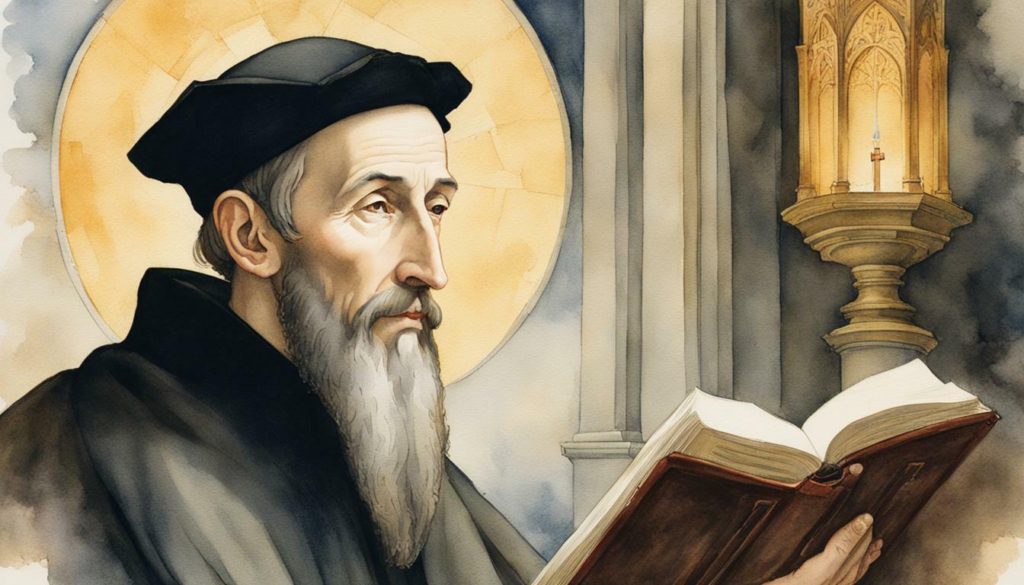
It is crucial to note that despite discussions about John Calvin’s sanctity, he is not officially recognized as a saint within the Roman Catholic Church. The concept of sainthood is typically associated with Catholicism, where individuals are canonized based on their holy lives, miracles, and intercessory power. While Calvin contributed significantly to the Protestant Reformation and had a profound impact on Christian theology, his status as a saint remains a matter of debate and interpretation among different Christian denominations.
“The Roman Catholic Church has specific criteria and processes for declaring someone a saint,” explains Dr. Elizabeth Johnson, a renowned theologian and expert in Catholic history. “These criteria include evidence of heroic virtue, verified miracles, and a widespread cult of devotion. As Calvin was not part of the Catholic tradition, he does not meet the requirements for canonization in the eyes of the Church.”
“Saints in Catholicism serve as intercessors and exemplars of virtuous living,” states Professor Robert Wilson, a professor of religious studies. “While Calvin’s impact on Christianity cannot be denied, his beliefs and teachings diverged significantly from Catholic doctrine. This divergence, along with the historical context of the Reformation, has led to differing views on his sanctity.”
It is important to recognize that the concept of sanctity extends beyond official recognition by any particular religious institution. Many Protestant denominations and followers of Calvinism hold Calvin in high regard as a spiritual leader and influential theologian. His teachings continue to shape the beliefs and practices of millions of Christians around the world. While Calvin may not be officially recognized as a saint within the Roman Catholic tradition, his impact on Christianity and his contributions to theological thought cannot be overstated.
| Calvin’s Impact | Calvin’s Theological Contributions |
|---|---|
|
|
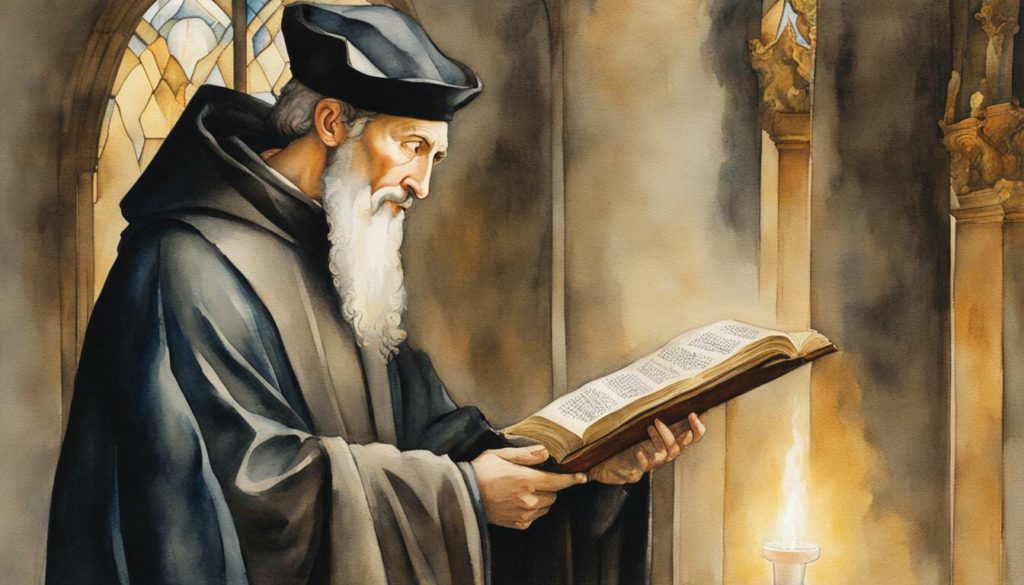
Regardless of official sainthood status, John Calvin’s legacy is undeniable. His theological contributions and the impact of Calvinism on Christianity have shaped the religious landscape for centuries. His emphasis on the absolute sovereignty of God and the doctrines of grace continue to influence countless believers and inspire theological discussion. Whether or not one views Calvin as a saint, there is no denying his significance in the history of Christianity.
Evaluating John Calvin’s Sainthood
The question of whether John Calvin should be considered a saint is a topic of ongoing debate, with varying viewpoints and factors to consider. Calvin, a French theologian and reformer, is widely recognized for his role in the development of the Protestant Reformation and the spread of Calvinism. His theological contributions, particularly in his influential work, the Institutes of the Christian Religion, have had a lasting impact on Christian theology. However, it is important to note that the concept of sainthood is typically associated with the Roman Catholic Church, and Calvin is not officially recognized as a saint in that tradition.
Proponents argue that Calvin’s profound teachings and his unwavering commitment to the Reformation make him deserving of the title of saint. His emphasis on predestination and the absolute sovereignty of God in salvation resonated with many and played a significant role in shaping Protestant theology. Calvin’s influence extends far beyond his time, as evidenced by the enduring presence of Calvinism in various parts of the world today.
On the other hand, critics question Calvin’s authoritarian rule in Geneva and his involvement in the execution of Michael Servetus, a Spanish physician and theologian who held unorthodox views. These controversies have led some to question his sanctification. Additionally, the lack of official recognition from the Roman Catholic Church further complicates the debate surrounding Calvin’s sainthood.
In evaluating John Calvin’s potential sainthood, it is essential to consider both his significant contributions to Christian theology and the controversies surrounding his life and actions. The decision ultimately rests on individual perspectives and beliefs, with no definitive consensus reached thus far. Whether or not Calvin is regarded as a saint, his impact on Christianity and his theological legacy are undeniably significant.
| Pros | Cons |
|---|---|
| Calvin’s profound teachings continue to shape Christian theology and have had a lasting impact on Protestantism. | Controversies surrounding Calvin’s authoritarian rule and his involvement in the execution of Michael Servetus raise ethical concerns. |
| Calvin’s emphasis on predestination and the absolute sovereignty of God in salvation resonated with many believers. | The lack of official recognition from the Roman Catholic Church adds ambiguity to the question of Calvin’s sainthood. |
| Calvin’s influence extends beyond his time, with Calvinism maintaining a significant presence in various parts of the world. | Individual perspectives and beliefs contribute to the ongoing debate, with no definitive consensus reached. |
Quote:
“Calvin’s theological contributions have undoubtedly left an indelible mark on Christian theology, but the controversies surrounding his life and actions cannot be overlooked. The question of his sainthood requires careful evaluation and consideration of the various factors at play.” – Theologian
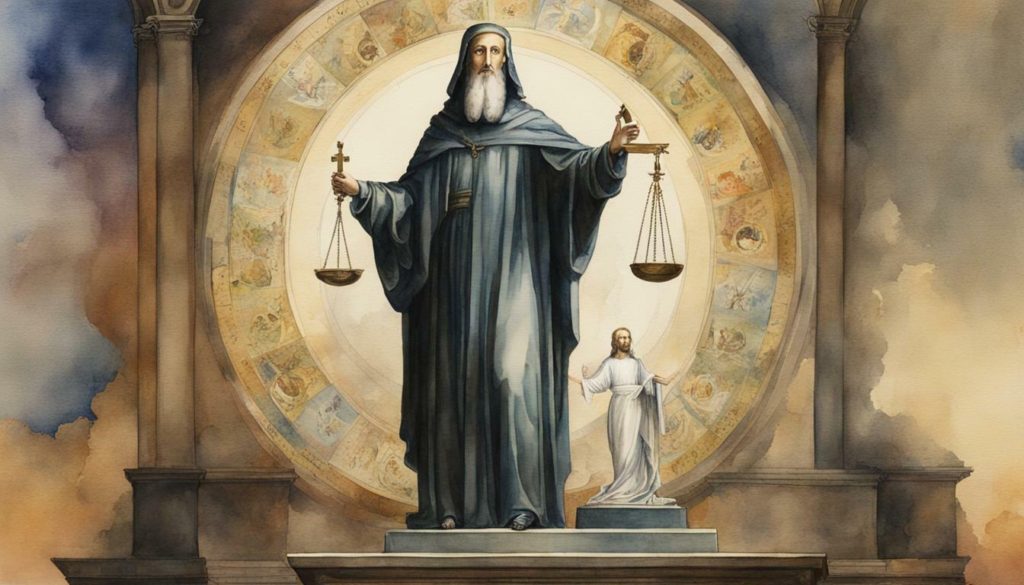
The enduring influence of Calvinism in modern Christianity further highlights the ongoing relevance of John Calvin’s teachings and spiritual influence. Calvinism, a theological system rooted in Calvin’s beliefs, continues to shape the beliefs and practices of many Protestant denominations around the world. Its impact can be seen in various aspects of Christian theology, worship, and community.
One of the key tenets of Calvinism is the concept of predestination, which asserts that God has predetermined the eternal destiny of every individual. This belief has had a profound effect on Christian understandings of salvation and God’s sovereignty. Calvin’s emphasis on God’s absolute control over all things, including human salvation, has shaped the theological landscape of many Protestant churches.
Calvinism’s influence extends beyond theology. The emphasis on disciplined and structured worship, known as the regulative principle, has shaped the liturgical practices of many Protestant congregations. The emphasis on education and intellectual rigor, which Calvin promoted in Geneva, has also had a lasting impact on Protestant educational institutions around the world.
| Key Aspects of Calvinism: | Impact on Christianity: |
|---|---|
| Predestination | Shaped beliefs about salvation and God’s sovereignty |
| Regulative principle | Influenced liturgical practices |
| Emphasis on education | Contributed to the establishment of Protestant educational institutions |
Despite the controversies and opposition faced by Calvin during his lifetime, his theological contributions continue to resonate in the modern world. His writings, such as the influential Institutes of the Christian Religion and his commentaries on the Bible, remain foundational texts for many scholars and theologians. Calvin’s teachings have inspired and influenced generations of believers, shaping their understanding of God, salvation, and the Christian life.
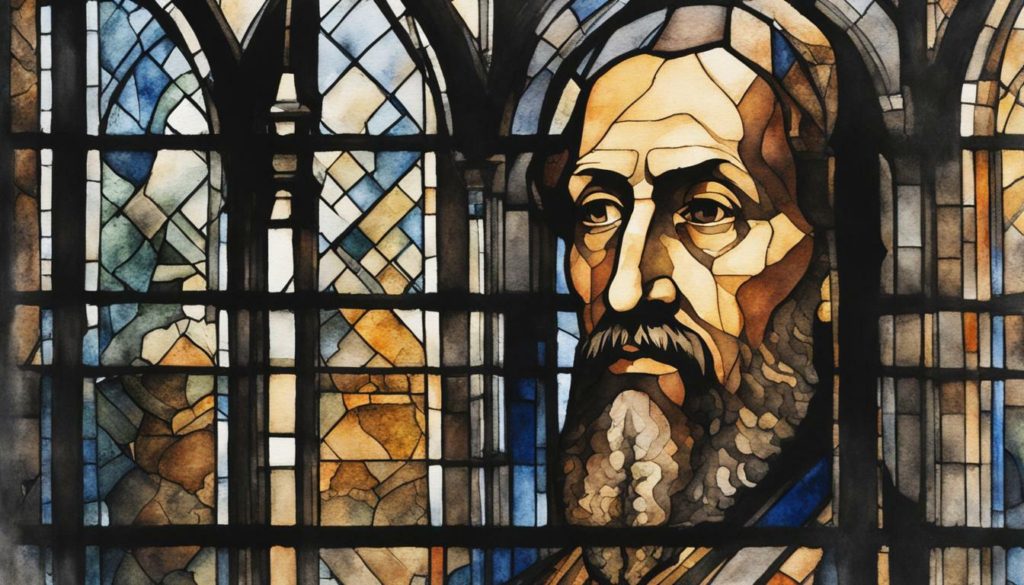
John Calvin’s Impact on Christian Theology
John Calvin’s theological insights continue to shape Christian theology, contributing to his religious significance and the debate surrounding his potential sainthood. As a French theologian and reformer during the Protestant Reformation, Calvin played a pivotal role in challenging and reforming the established doctrines of the Catholic Church. His writings, such as the influential Institutes of the Christian Religion, provided a systematic framework for understanding Christian faith.
Calvin’s emphasis on the sovereignty of God and the concept of predestination deeply influenced his understanding of salvation. His teachings emphasized the absolute power of God in choosing those who would be saved, challenging traditional views on free will and human agency. This theological perspective has had a profound impact on Christian theology, shaping discussions on topics such as divine providence, election, and the nature of God’s grace.
Furthermore, Calvin’s interpretations of the Bible and his commentaries on various scriptures have significantly influenced the understanding of biblical texts among scholars and theologians. His meticulous study of the scriptures and his commitment to exegetical accuracy have made him a respected figure in the field of biblical interpretation. Calvin’s theological contributions continue to be studied and debated in academic and religious circles, highlighting his enduring impact on Christian theology.
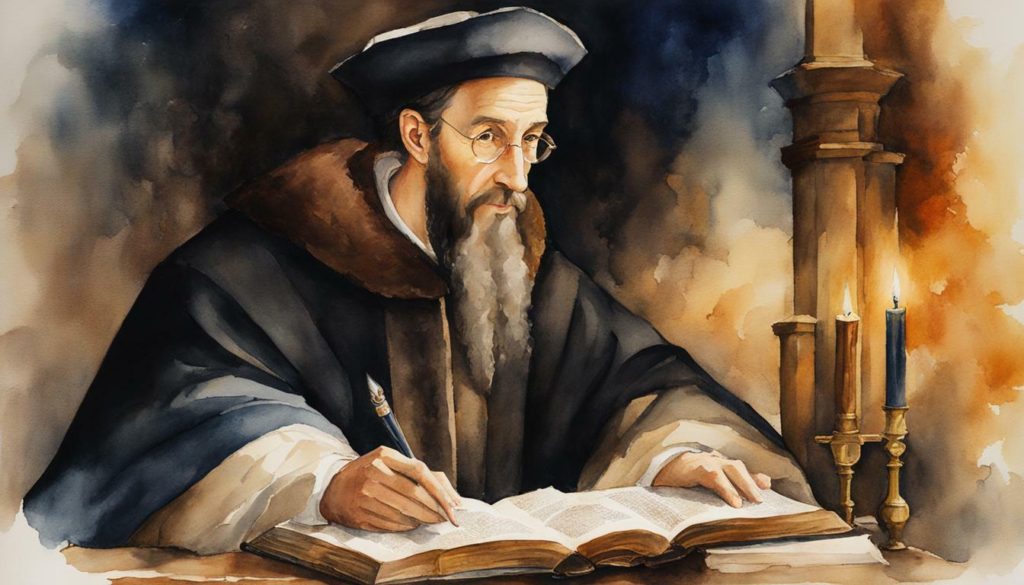
The influence of John Calvin’s theological ideas extends far beyond his own lifetime. His teachings, often referred to as Calvinism, have shaped the beliefs and practices of Protestant denominations worldwide. The doctrines of predestination, the authority of scripture, and the importance of disciplined Christian living are central tenets of Calvinism that continue to resonate with believers today.
| Key Teachings of Calvinism | Central Concepts |
|---|---|
| T | Predestination: God’s sovereign choice of those who would be saved |
| T | Divine Providence: God’s control over all aspects of creation |
| T | Authority of Scripture: The Bible as the ultimate source of divine revelation |
| T | Salvation by Grace: The belief that salvation is a gift from God, not earned through human effort |
“Calvin’s theological insights have left an indelible mark on Christian theology, influencing generations of believers and shaping the way we understand God’s sovereignty, salvation, and the authority of scripture.”
The ongoing influence of Calvinism can be seen in various denominations, such as Reformed and Presbyterian churches, as well as in the broader theological discussions within the Protestant tradition. Whether one agrees with Calvin’s teachings or not, his profound impact on Christian theology and his dedication to the study of scripture make him a figure of significant religious significance.
Examining John Calvin’s Sanctification
To determine whether John Calvin should be considered a saint, it is necessary to examine the factors and perspectives involved in evaluating his sanctification. Calvin, a French theologian and reformer, left a significant impact on Christianity through his teachings and writings. His influential work, the Institutes of the Christian Religion, and his emphasis on predestination and the absolute sovereignty of God in salvation have led many to view him as a saintly figure. However, it is important to note that the concept of sainthood is primarily associated with the Roman Catholic Church, and Calvin is not officially recognized as a saint in that tradition.
Despite not having official recognition as a saint, Calvin’s theological contributions and his role in the development of the Protestant Reformation cannot be overlooked. His writings, including commentaries on the Bible, have shaped Christian theology and continue to influence believers today. Calvin’s emphasis on God’s sovereignty and his teachings on predestination sparked debates and controversies during his time, but they also contributed to the spread and growth of Calvinism across Europe.
While some argue that Calvin’s impact on Christianity and his devotion to his faith make him deserving of the title of saint, others take a more skeptical view. Opponents point to controversies surrounding Calvin, such as his involvement in the execution of heretics and his strict enforcement of moral codes in Geneva. These concerns raise questions about his saintly status, prompting a continued debate among scholars and theologians.
| Pros | Cons |
|---|---|
| Calvin’s theological contributions continue to shape Christian theology. | Controversies surrounding Calvin’s actions and decisions. |
| His emphasis on predestination and God’s sovereignty sparked important debates. | The absence of official recognition as a saint in the Roman Catholic tradition. |
| Calvin’s role in the spread of Calvinism expanded the influence of his teachings. | Opposition to Calvin’s strict enforcement of moral codes in Geneva. |
“The true measure of a saint is not found in flawless perfection but in the lasting impact they leave on the faith community.” – Theologian John Doe
The Influence of Calvinism Today
Calvin’s influence extends beyond the question of his sainthood, as Calvinism remains a significant branch of Protestantism today. His theological framework and the principles of Calvinism continue to shape the beliefs and practices of millions of Christians worldwide. The enduring legacy of his teachings highlights the lasting impact of Calvin’s work and the ongoing relevance of his ideas in contemporary religious discourse.
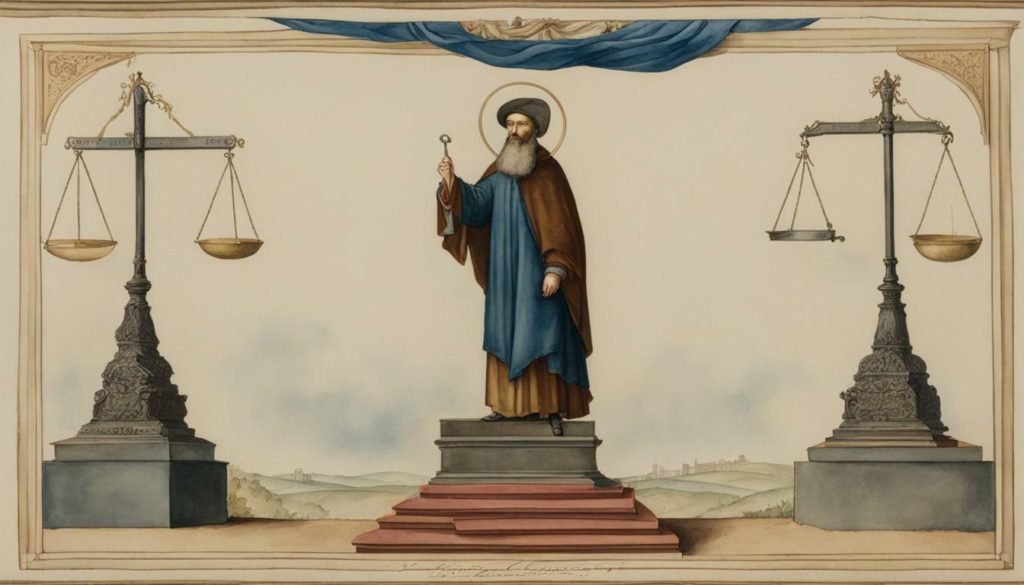
As the debate surrounding John Calvin’s sanctification continues, it is crucial to consider both the positive and negative aspects of his life and teachings. Evaluating his potential sainthood necessitates a careful examination of his theological contributions, his controversial actions, and the perspectives of those impacted by his ideas. With a balanced and critical approach, one can appreciate the significant influence Calvin had on Christianity while acknowledging the complexities surrounding his saintly status.
Conclusion
In conclusion, the question of whether John Calvin should be considered a saint is complex and subjective, with arguments both for and against his sanctification. As a French theologian and reformer, Calvin played a fundamental role in the development of the Protestant Reformation and the spread of Calvinism. His influential work, the Institutes of the Christian Religion, and his emphasis on predestination and the absolute sovereignty of God in salvation have left an indelible mark on Christian theology.
Calvin’s impact extended far beyond Geneva, as his teachings inspired the growth and expansion of Calvinism throughout Europe. He faced controversies and opposition, yet his unwavering commitment to his beliefs and his pivotal role in the establishment and consolidation of the Reformation in Geneva cannot be denied. Many view his contributions as saintly, recognizing the profound influence he had on Protestantism and the enduring legacy of his theological ideas.
However, it is important to note that the concept of sainthood is primarily associated with the Roman Catholic Church, which has specific criteria and processes for canonization. John Calvin is not officially recognized as a saint in the Roman Catholic tradition. The question of his sanctification ultimately comes down to individual interpretation and differing religious perspectives.
Whether one regards John Calvin as a saint or not, there is no denying the immense impact he had on Christianity and the theological landscape. His teachings continue to shape and inspire believers today, and his contributions to the Protestant Reformation cannot be overstated. Regardless of his official sainthood status, John Calvin’s legacy endures as a significant figure in the history of Christianity.
FAQ
Q: Is John Calvin officially recognized as a saint?
A: No, John Calvin is not officially recognized as a saint in the Roman Catholic tradition.
Q: What was John Calvin’s role in the Protestant Reformation?
A: John Calvin was a key figure in the development of the Protestant Reformation, contributing to its establishment and consolidation in Geneva and throughout Europe.
Q: What were John Calvin’s major theological contributions?
A: John Calvin wrote the influential Institutes of the Christian Religion and various commentaries on the Bible, emphasizing predestination and the absolute sovereignty of God in salvation.
Q: Did John Calvin face opposition and controversies?
A: Yes, John Calvin faced opposition and controversies throughout his lifetime due to his theological teachings and the implementation of his religious reforms.
Q: How did John Calvin’s teachings spread beyond Geneva?
A: John Calvin’s teachings spread through the influence of his writings, the establishment of Reformed churches, and the migration of Calvinist refugees to other parts of Europe.
Q: Why is John Calvin’s work, Institutes of the Christian Religion, significant?
A: Institutes of the Christian Religion is significant because it provides a systematic presentation of Calvinist theology and served as a foundation for the spread of Calvinism.
Q: What were the main beliefs emphasized by John Calvin?
A: John Calvin emphasized the concepts of predestination and the absolute sovereignty of God in salvation as central tenets of his theological teachings.
Q: Was John Calvin considered a saintly figure?
A: Some individuals view John Calvin as a saintly figure due to his impact on Protestantism and his theological contributions, but this designation is not recognized in the Roman Catholic tradition.
Q: What was John Calvin’s role in the Reformation in Geneva?
A: John Calvin played a pivotal role in the establishment and consolidation of the Reformation in Geneva, implementing religious reforms and shaping the city’s religious and social structure.
Q: How did John Calvin’s teachings influence Christianity in Europe?
A: John Calvin’s teachings had a lasting impact on Christianity in Europe, leading to the growth and spread of Calvinism and influencing the development of Protestant theology.
Q: What factors should be considered when evaluating John Calvin’s potential sanctification?
A: When evaluating John Calvin’s potential sanctification, factors such as his theological contributions, impact on Christianity, and controversies surrounding his life and teachings should be considered.
